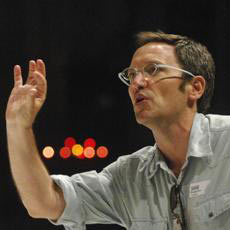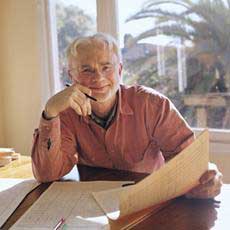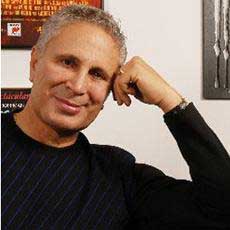BARBARA KLEIN: Welcome to THIS IS AMERICA in VOA Special English. I'm Barbara Klein.
STEVE EMBER: And I'm Steve Ember. Today we present the second of two programs about contemporary classical music written by composers working in the United States. We begin with Osvaldo Golijov. He grew up in La Plata, Argentina, in a Jewish family from eastern Europe. He studied music in Israel and currently lives in the United States.
(MUSIC)
BARBARA KLEIN: This is Osvaldo Golijov's "La Pasion segun San Marcos," or "Saint Mark Passion." He wanted it to express the story of Jesus' last days as seen through the Latin American experience. The performance includes dancers and folk instruments like the accordion and guitar.
|
 Osvaldo Golijov |
Osvaldo Golijov's more recent work "Azul" is a cello concerto written for Yo-Yo Ma and the Boston Symphony Orchestra:
(MUSIC)
STEVE EMBER: John Adams began his music career playing the clarinet, but he also began composing as a child.
His works over the years include the opera "Nixon in China," based on the historic visit by President Richard Nixon in 1972. Another of his works is "Shaker Loops":
(MUSIC)
|
 John Adams |
(MUSIC: "On the Transmigration of Souls," Atlanta Symphony Orchestra)
John Adams took words from missing-person signs that had been put up by friends and family members immediately after the attacks. He also used the names of victims and personal stories about their lives that appeared in the newspaper. He said he wanted the music to express a sense of otherworldliness, like the listener is in the presence of generations of souls.
John Adams is a writer not only of music: he is currently working on a novel.
(MUSIC: "Red Violin Caprices" by John Corigliano, violinist Philippe Quint)
BARBARA KLEIN: John Corigliano writes many different kinds of music. Much of it is bold and expressive. He grew up in New York City in a family of musicians.
|
 John Corigliano |
(MUSIC: "All Along the Watchtower," Buffalo Philharmonic Orchestra)
STEVE EMBER: For some people in the classical music world, the past 10 to 15 years have been a difficult period. Budgets have shrunk, a situation that only worsened with the recent recession. And there is growing competition from other forms of entertainment.
Also, public schools in the United States have reduced classical music education.
BARBARA KLEIN: Still, there is reason to celebrate the variety and energy of music created in the United States today. So says Frank Oteri, himself a composer. He works for the American Music Center, a nonprofit group that supports classical music. He started its online magazine, the NewMusicBox.
Frank Oteri says the Internet and new technologies have increased the competition for people's attention and money. But he points out that technology has also made new music available to people all over the world 24 hours a day. He says there has never been a richer time for so many musicians and so many kinds of new music.
We asked Frank Oteri if there is something that defines the work of modern American composers. That is a hard question, he says, because there are so many kinds of music being made right now.
But he believes this variety in music is informed by the variety in backgrounds of a nation of immigrants. If anything defines American music, he says, it is a spirit of redefinition and reinvention.
STEVE EMBER: Adam Schoenberg is a young composer adding to this rich variety. He started playing the piano at the age of three. But it was not until college at Oberlin in Ohio that he decided to study music more seriously. He recently earned a doctorate from the Juilliard School in New York.
Here is his piece "Finding Rothko" which he wrote for the IRIS chamber orchestra in Tennessee.
(MUSIC)
STEVE EMBER: We asked Adam Schoenberg about his composing process.
ADAM SCHOENBERG: "Every composer is different. I always get my notes at the piano, first and foremost. And I tend to sit down and improvise. Within those improvisations certain motives and ideas will come about that I like."
STEVE EMBER: He writes down his ideas, then continues his work away from the piano. He uses a computer notation program called Finale to put the work together.
So what does Adam Schoenberg think of contemporary classical music?
ADAM SCHOENBERG: "Something happened post-World War Two where a divide occurred between the audience and the composer. And today I feel like composers are reconnecting with the audience and the orchestra. I think it's an incredibly exciting time because we can now draw on so many different sources that we are influenced by, and I sort of feel like anything goes."
(MUSIC: "Gazebo Dances" by John Corigliano, University of Texas Wind Ensemble)
BARBARA KLEIN: Our program was written and produced by Dana Demange. I'm Barbara Klein.
STEVE EMBER: And I'm Steve Ember. You can read and listen to this program at voaspecialenglish.com. You can also find last week's program about composers, including two women who have won Pulitzer Prizes, Ellen Taaffe Zwilich and Jennifer Higdon. You can also follow us on Facebook and Twitter at VOA Learning English. Join us again next week for THIS IS AMERICA in VOA Special English.
accordion: a musical instrument that you hold in both hands to produce sounds. You press the two ends together and pull them apart and press keys and buttons to produce the different notes.(手风琴)
clarinet: a musical instrument of the woodwind group. It is shaped like a pipe and has a reed and a mouthpiece at the top that you blow into.(单簧管;黑管)
Classical music, but not what you might think
A student orchestra where the students are also the teachers
Make beautiful music under the stars at Ravinia
(来源:VOA 编辑:陈丹妮)
